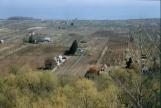1
Today, the many acres of agricultural land that were once orchards have been developed for housing, commerce and industry, creating economic and cultural shifts in the community. Many of the companies that once supported the fruit industry have disappeared and freight trains no longer stop at Grimsby to be loaded with fresh fruit. The focus is now on the wine industry and Agri-Tourism. The development of the wine route has made Niagara a premiere destination for wine lovers. Local produce is showcased in specialty products found in small stores in the communities and at the wineries. Many of these transformations of the local fruit industries can be attributed to impacts of technology, urbanization, new and revised legislation and shifting markets.2
TECHNOLOGY HAS CHANGED THE FRUIT INDUSTRYWith the increase in mechanization and the invention of many time and labour saving technologies there has been a decrease in employment in the fruit industries as fewer production workers are required. A large portion of the workforce used today for picking and manufacturing is coming from overseas. There are fewer jobs today in the factories but these jobs are becoming more advanced and positions are being created to keep up with technology. Industry is not as simple as it once was. Now factory jobs require less labour and more skill.
3
Llewellyn Smith Explains the E. D. Smith Factory in the 1980's and 90's10 February 2009
E.D. Smith's Jam Factory, E.D. Smith Property, Highway 8, Winona, Ontario, Canada
 Credits:
Credits:Smith, Llewellyn
Grimsby Museum Collection
4
Llewellyn Smith Explains the E. D. Smith Factory in the 1980's and 90's10 February 2009
E.D. Smith's Jam Factory, E.D. Smith Property, Highway 8, Winona, Ontario, Canada
 Credits:
Credits:Smith, Llewellyn
Grimsby Museum Collection
5
Llewellyn Smith explains that Now Factory Jobs Require Less Labour and More Skill10 February 2009
E.D. Smith's Jam Factory, E.D. Smith Property, Highway 8, Winona, Ontario, Canada
 Credits:
Credits:Smith, Llewellyn
Grimsby Museum Collection
6
HOUSES AND BUSINESS ARE COVERING FERTILE FRUIT LANDUrban sprawl has had an impact on the agricultural industries. As more room is needed for roads, homes and other infrastructure, more land is lost for growing fruit. The sale of land to developers is something that has impacted the area in the last few decades. Many residents can still remember when farms were being turned into subdivisions. For many farmers their land was becoming worth more to sell and turn into homes than used as farm land.
7
Lew Puddicombe and Holly Gonsalves Discuss the Future of the Puddicombe Family Farm2 October 2008
Puddicombe Estate Farms and Winery, Winona, Ontario, Canada
 Credits:
Credits:Puddicombe, Lew
Gonsalves, Holly
Grimsby Museum Collection
8
View of Orchards from the EscarpmentMay 1956
Grimsby, Ontario, Canada
 Credits:
Credits:Grimsby Museum Collection
Photograph taken by Paul W. Bennington
9
Aerial View of Grimsby Showing Urban Development1974
Grimsby, Ontario, Canada
 Credits:
Credits:Grimsby Museum Collection
10
THE IMPACT OF LAW AND THE GREENBELT LEGISLATIONOntario's Greenbelt is an area that consists of green spaces that are permanently protected. The introduction of Greenbelt legislation is to keep urban development from destroying natural areas and farms in the Golden Horseshoe. The Greenbelt legislation, passed into law in 2005, protects 1.8 million acres by allowing the government to establish zoning for land use. This means that many farmers in the Golden Horseshoe now have their land permanently designated as agricultural land, and may not sell their farms for urban or commercial development. In the Niagara Region alone the Greenbelt Plan protects 100,000 acres of agricultural land containing tender fruit and grapes.
11
SHIFTING MARKETSTHE LAST CANADIAN CANNERS PLANT CLOSED FOR BUSINESS
After one hundred and twelve years of operation the last Canadian Canners plant in Canada, located in St. David's, Ontario closed on March 31, 2008. As a result of the closure, canned peaches and pears sold in Niagara will now be shipped from China and other offshore countries. With the closure of the plant, many Niagara growers face an uncertain future. Cherry Lane Frozen Fruit has also stopped purchasing sweet cherries because of market decline. Many farmers have pulled out peach, pear and other soft fruit orchards and are choosing to replant with wine grapes. With many households choosing to purchase fresh fruits (a great percentage of which is imported) canned fruit sales have decreased in recent years. Also because of free trade and increasing wages in Canada, canneries were just not profitable any more. The closure of the St. David's cannery left the fruit of nine hundred hectares of peach and pear trees without a market.
12
THE CLOSURE OF MANY JUICE PRODUCTION COMPANIESIn June of 2007, many local grape growers lost their market for juice grapes. The Cadbury Schweppes plant in St. Catharines once produced Welch's grape juice and other beverages. The closure has impacted at least one hundred and five growers. It is estimated that their crops covered 1,500 acres.
13
Debbie Zimmerman Describes the Impact on Local Growers After the Schweppes Closure2008-Dec
The Grape Growers of Ontario, St. Catharines, Ontario, Canada
 Credits:
Credits:Zimmerman, Debbie
Grimsby Museum Collection
14
THE TRANSITION OF MANY FARMS TO "PICK-YOUR-OWN"Pick-Your-Own farms have seen a boost in recent years and many farmers in the Grimsby area operate, either fully or partially, in this way.